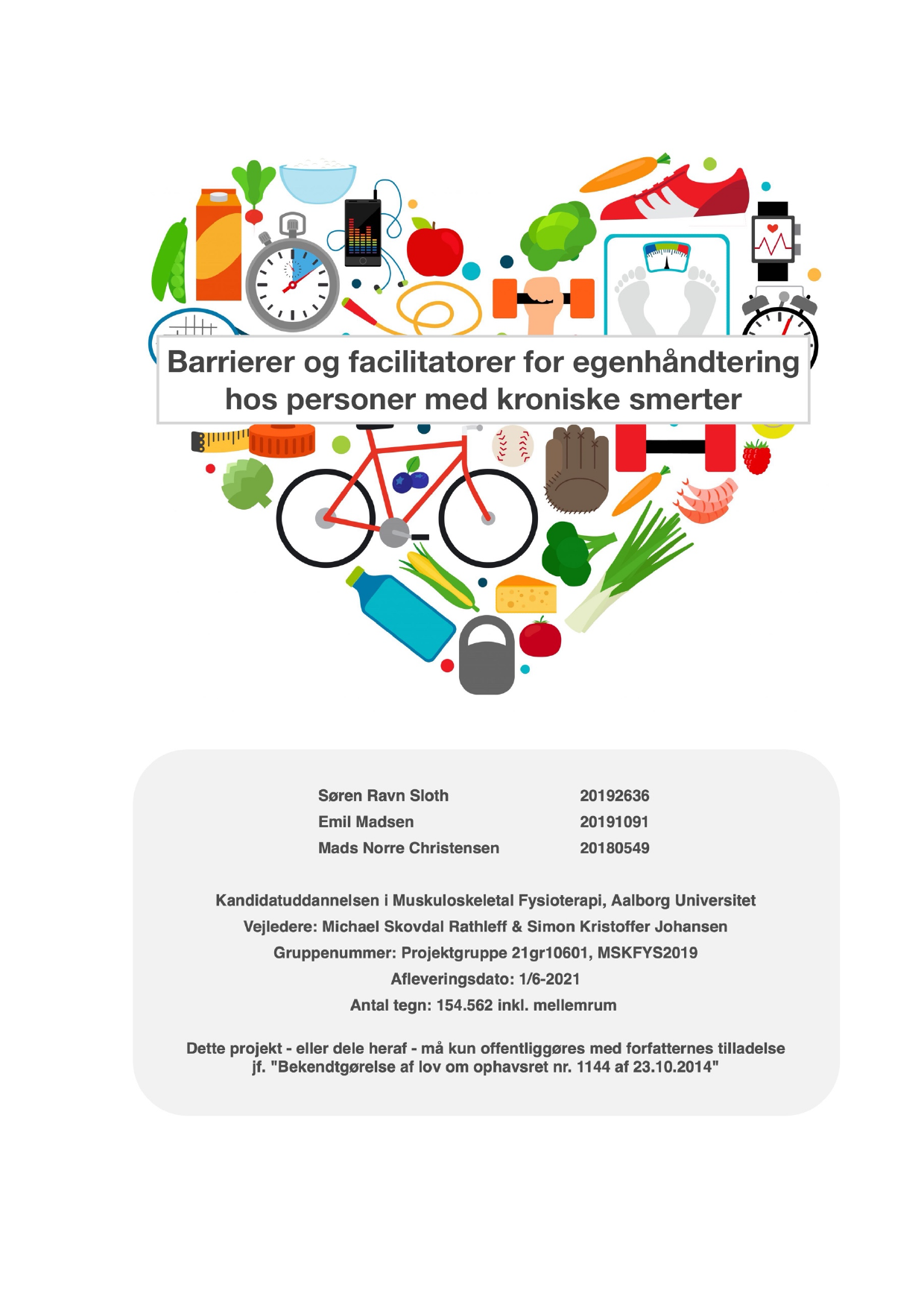
Barrierer og facilitatorer for egenhåndtering hos personer med kroniske smerter
Oversat titel
Barriers and facilitators for self-management experienced by people with chronic musculoskeletal pain
Forfattere
Semester
4. semester
Udgivelsesår
2021
Afleveret
2021-05-31
Antal sider
99
Abstract
Baggrund: Kroniske smerter er et stigende problem og det estimeres, at der i 2017 var 1.300.000 danskere som levede med kroniske smerter. Ifølge Sundhedsstyrelsens anbefalinger omhandlende behandling af kroniske smerter, samt beskrivelsen af et typisk behandlingsforløb, fremgår det, at der stilles store krav til kroniske smertepatienters evne til egenhåndtering. For at hjælpe kroniske smertepatienter i denne proces bør sundhedsprofessionelle tage højde for de specifikke barrierer og facilitatorer som kroniske smertepatienter oplever, men disse er aktuelt er ikke undersøgt i en dansk kontekst. Formål: Formålet med dette projekt var at undersøge hvilke barrierer og facilitatorer personer med kroniske smerter oplever, når de skal håndtere et liv præget af smerter. Metode: Projektet tog afsæt i en kvalitativ og fænomenologisk tilgang. 11 informanterne, med primære kroniske muskuloskeletale smerter, blev rekrutteret fra Aalborg Kommune, hvorefter de gennemgik et semistruktureret enkeltpersonsinterview. Interviewene blev analyseret via en tematisk analyse. Resultater: Der blev identificeret henholdsvis fem barrierer og facilitatorer for at håndtere et liv præget af kroniske smerter. De fem barrierer omfattede: 1) identitet og rolle, 2) forståelse og validering, 3) uvished, 4) tanker og følelser, og 5) planlægning og prioritering af ressourcer. Under temaet “identitet og rolle” forekom der tre sub-temaer: 1) strider mod identitet, 2) social rolle og 3) accept af begrænsninger. Endvidere forekom der under temaet “tanker og følelser” tre sub-temaer: 1) bekymring om fremtiden, 2) føler sig som en byrde og 3) tankemylder og søvnløshed. I relation til facilitatorer blev følgende temaer identificeret: 1) accept af nuværende situation, 2) social støtte og forståelse, 3) pacing, 4) optimisme, og 5) smertelindrende strategier og behandling. Under temaet “social støtte og forståelse” forekom der tre sub-temaer: 1) forståelse fra andre, 2) social støtte i dagligdagen og 3) validering af smerteoplevelse. Konklusion: Resultaterne af nærværende projekt giver klinikere og forskere et unikt indblik i hvilke barrierer og facilitatorer, som gør det sværere eller lettere for kroniske smertepatienter at håndtere et liv præget af kroniske smerter. Implementering af de identificerede barrierer og facilitatorer kan hjælpe sundhedsprofessionelle til bedre at forstå de udfordringer, som kroniske smertepatienter oplever, når de skal egenhåndtere deres smertetilstand.
Introduction: Chronic pain is an increasing burden and in 2017 it was estimated that 1.300.000 Danes were living with chronic pain. According to clinical guidelines regarding the treatment of chronic pain, as well as the description of a usual course of treatment, it appears that there is a demand on chronic pain patients' ability to self-manage. To help people with chronic pain healthcare professionals should take into account the specific barriers and facilitators that people with chronic pain experience. However, these are not currently studied in the context of Denmark. Objective: The aim of this study was to investigate which barriers and facilitators people with chronic pain experience when trying to self-manage their chronic condition. Method: This study was based on a qualitative and phenomenological approach. Eleven informants with primary chronic musculoskeletal pain were recruited through a rehabilitation center in Denmark. These informants completed semi-structured interviews, and the interviews were analyzed using a thematic analysis. Results: Five barriers and facilitators for self-management were identified. The five barriers included: 1) identity, 2) validation, 3) uncertainty, 4) thoughts and emotions, and 5) prioritizing resources. The theme “identity” included three sub-themes: 1) against one's identity, 2) social role and 3) acceptance of limitations. Furthermore, the theme “thoughts and emotions” included three sub-themes: 1) worrying about the future, 2) feeling like a burden, and 3) thoughts and sleep disturbances. Regarding facilitators the following themes were identified: 1) acceptance of the current situation, 2) social support, 3) pacing, 4) optimism, and 5) pain-relieving strategies and treatment. The theme “social support” included three sub-themes: 1) validation from others, 2) social support in everyday life, and 3) validation of the pain experience. Conclusion: This current study provides clinicians and researchers with a unique insight into the barriers and facilitators perceived by chronic pain patients when trying to self-manage their chronic pain condition. Implementing these barriers and facilitators can help healthcare professionals better understand the challenges that chronic pain patients face when self-managing their chronic pain condition.
Emneord
